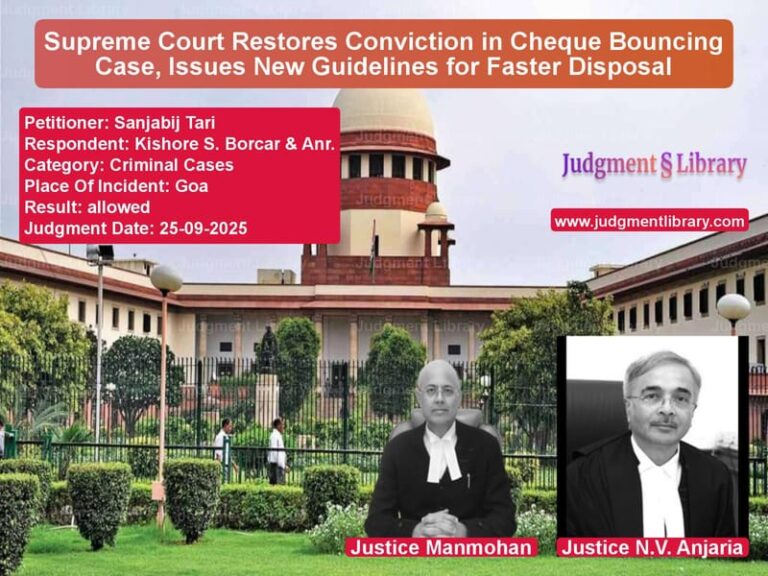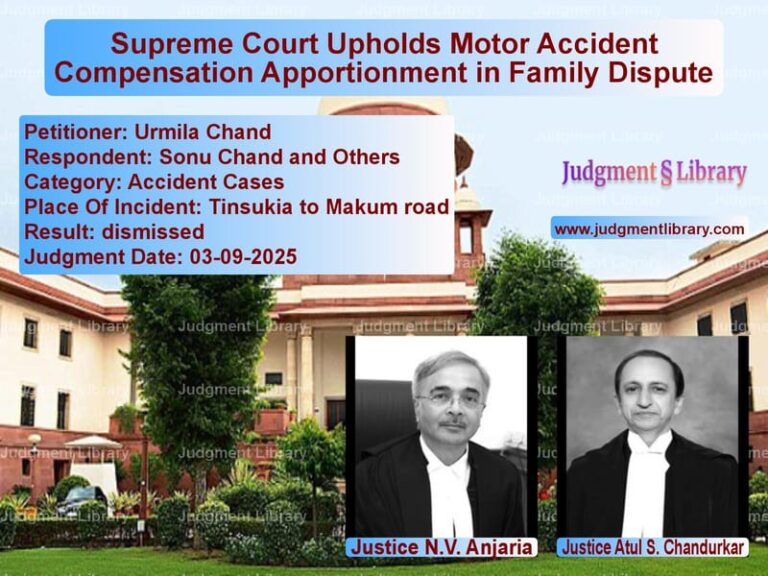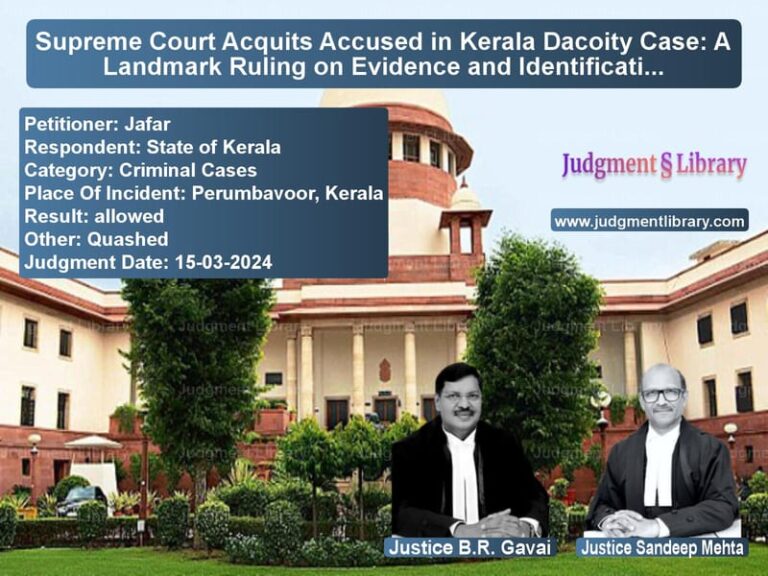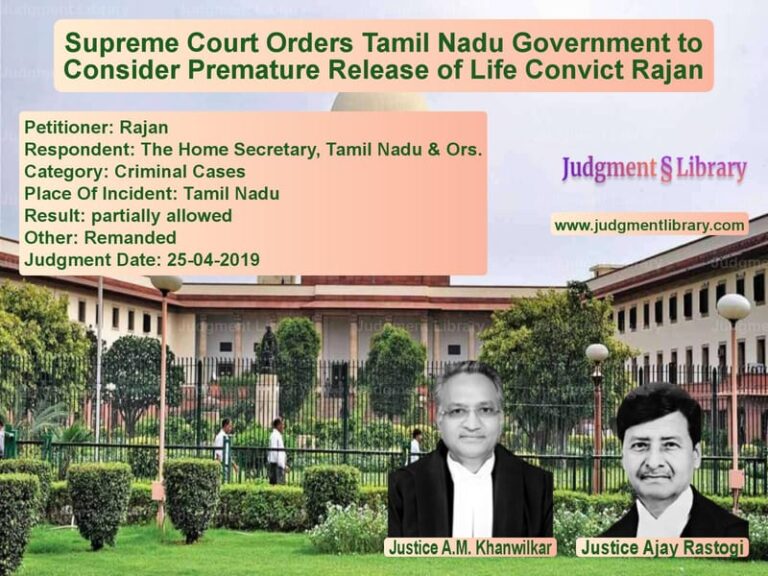Industrial Sewerage Cess: Supreme Court’s Verdict on Vasant Chemicals Ltd. Case
The case of Vasant Chemicals Ltd. vs. The Managing Director, Hyderabad Metropolitan Water Supply & Sewerage Board addresses a crucial legal question: Can an industrial unit be subjected to sewerage cess even if its premises are not directly connected to a municipal sewer system? This Supreme Court ruling has significant implications for industrial taxation and environmental compliance.
Vasant Chemicals Ltd., a manufacturer of dye intermediates, contested the imposition of sewerage cess levied by the Hyderabad Metropolitan Water Supply and Sewerage Board (HMWS&SB). The dispute centered around whether industries that process wastewater through a common treatment plant before discharging it into the municipal sewer system should be subject to such levies. The Supreme Court upheld the cess, reinforcing the principle that industrial units utilizing public sewerage infrastructure—directly or indirectly—are liable for its costs.
Background of the Case
Vasant Chemicals Ltd., along with other industries in the Jeedimetla Industrial Area, established a Common Effluent Treatment Plant (CETP) under the Jeedimetla Effluents Treatment Limited (JETL). The plant was created to pre-treat industrial wastewater before discharge into the municipal sewer system.
In 1995, Vasant Chemicals Ltd. entered into an agreement with HMWS&SB for water supply, which included a clause mandating the payment of a sewerage cess. Despite this agreement, the company argued that since its effluents were treated at JETL and not directly discharged into the municipal sewer, it should be exempt from the cess.
The High Court of Andhra Pradesh ruled in favor of the tax authorities, leading to an appeal before the Supreme Court.
Arguments by the Petitioner (Vasant Chemicals Ltd.)
- The company’s premises were not directly connected to the sewer system of HMWS&SB.
- The effluents were first treated at JETL, which was already paying various charges to the Board.
- Section 55 of the HMWS&S Act states that premises not served by a municipal sewer should not be subject to sewerage cess.
- The levy amounted to double taxation, as both JETL and individual industries were being charged.
- The agreement with the Board should not override statutory exemptions.
Arguments by the Respondent (HMWS&SB)
- The sewerage cess was a statutory obligation under Section 55 of the HMWS&S Act.
- Although Vasant Chemicals Ltd. was not directly connected to the sewer, its effluents ultimately reached the municipal sewer system via JETL.
- Clause 16 of the agreement explicitly required the payment of sewerage cess.
- The charges paid by JETL were distinct from the cess imposed on individual industries.
- Double taxation did not arise, as JETL’s payments were for its infrastructure costs, while industries were liable for their sewage discharge.
Supreme Court’s Ruling
The Supreme Court upheld the levy, stating:
“The levy of sewerage cess is in accordance with Section 55 of the HMWS&S Act. The statutory liability arises from the fact that the appellant’s industrial effluents are ultimately discharged into the municipal sewer system, even if they first pass through JETL. The contention that the appellant is covered under the proviso to Section 55 of the Act is not sustainable.”
- The Court emphasized that industrial units benefiting from public sewer infrastructure are liable for its upkeep, regardless of intermediary treatment.
- The agreement with the Board, including the cess clause, was deemed legally binding.
- It rejected the double taxation claim, distinguishing between sewerage cess and infrastructure charges paid by JETL.
Implications of the Judgment
The ruling clarifies key aspects of taxation and environmental regulation:
- Expansion of Taxable Scope: Even indirect use of municipal sewers can attract taxation.
- Contracts vs. Statutory Liabilities: Private agreements cannot override statutory tax obligations.
- Environmental Compliance: Industries must ensure full regulatory compliance, including financial obligations.
- Precedent for Future Cases: The decision will influence taxation disputes involving industrial wastewater treatment.
In conclusion, the Supreme Court’s decision underscores the principle that industries utilizing public infrastructure, even indirectly, must contribute to its maintenance. This ruling ensures a fair distribution of environmental costs and reinforces the necessity for regulatory compliance in industrial operations.
Petitioner Name: Vasant Chemicals Ltd..Respondent Name: The Managing Director, Hyderabad Metropolitan Water Supply & Sewerage Board.Judgment By: Justice R. Banumathi, Justice Indira Banerjee.Place Of Incident: Hyderabad, Telangana.Judgment Date: 13-02-2019.
Don’t miss out on the full details! Download the complete judgment in PDF format below and gain valuable insights instantly!
Download Judgment: Vasant Chemicals Ltd vs The Managing Directo Supreme Court of India Judgment Dated 13-02-2019.pdf
Direct Downlaod Judgment: Direct downlaod this Judgment
See all petitions in Environmental Cases
See all petitions in Judgment by R. Banumathi
See all petitions in Judgment by Indira Banerjee
See all petitions in dismissed
See all petitions in supreme court of India judgments February 2019
See all petitions in 2019 judgments
See all posts in Environmental Cases Category
See all allowed petitions in Environmental Cases Category
See all Dismissed petitions in Environmental Cases Category
See all partially allowed petitions in Environmental Cases Category







